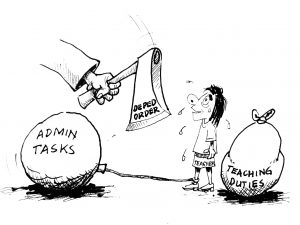Finally, with the recent issuance of DepEd Order No. 2 series of 2024, Filipino teachers will be relieved from administrative tasks that have long burdened their already hectic schedules. This development signifies a much-needed boost to the education system in the Philippines, as it allows educators to focus more on their primary duty—teaching.
For years, teachers in the country have been overwhelmed with paperwork, record-keeping, and other administrative responsibilities, leaving them with limited time and energy to fully engage with their students. The recent measures to streamline administrative tasks will undoubtedly enhance the overall quality of education in the Philippines.
Indeed, it’s been one of the major obstacles faced by Filipino teachers—the excessive paperwork and redundant administrative duties that they have to fulfill. Countless hours were wasted on mind-numbing tasks like filling out endless forms, documenting attendance, and preparing reports. This administrative burden not only took away valuable time from instructional activities but also negatively impacted teachers’ work-life balance and professional development.
By eliminating or minimizing such administrative tasks, teachers can now redirect their efforts toward more meaningful and impactful aspects of their profession—such as lesson planning, student support, and curriculum development. Moreover, the reduction in administrative tasks will foster a more collaborative and innovative teaching environment. Filipino educators will finally have the opportunity to engage in meaningful discussions, share best practices, and collaborate with colleagues.
With less paperwork and more time for interaction, teachers will be able to expand their knowledge and skills through professional development activities, workshops, and conferences. Furthermore, this will allow teachers to fully focus on meeting the individual needs of their students. By having more time and energy, educators can personalize their teaching methods, offer more individual attention, and cater to diverse learning styles.
We hope this order will take effect for real and not just end up as a similar story. To ensure that this is implemented, teachers should learn to complain to the highest authorities in case the order is being ignored by their immediate superiors. Teachers, on the other hand, should make sure that they now devote more time to teaching-related tasks as a way of helping their students succeed academically.




